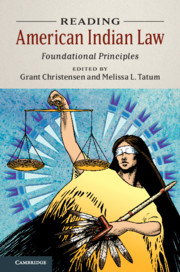Book contents
- Reading American Indian Law
- Reading American Indian Law
- Copyright page
- Dedication
- Contents
- Editors and Contributors
- Preface
- Acknowledgments
- Introduction
- Part I Core Concepts
- Part II Voices
- Part III Property
- 9 Sovereignty and Property
- 10 The Legacy of Allotment
- 11 A Common Law for Our Age of Colonialism: The Judicial Divestiture of Indian Tribal Authority over Nonmembers
- 12 In Defense of Property
- Part IV (Mis)Understandings
- Book part
- References
11 - A Common Law for Our Age of Colonialism: The Judicial Divestiture of Indian Tribal Authority over Nonmembers
from Part III - Property
Published online by Cambridge University Press: 11 December 2019
- Reading American Indian Law
- Reading American Indian Law
- Copyright page
- Dedication
- Contents
- Editors and Contributors
- Preface
- Acknowledgments
- Introduction
- Part I Core Concepts
- Part II Voices
- Part III Property
- 9 Sovereignty and Property
- 10 The Legacy of Allotment
- 11 A Common Law for Our Age of Colonialism: The Judicial Divestiture of Indian Tribal Authority over Nonmembers
- 12 In Defense of Property
- Part IV (Mis)Understandings
- Book part
- References
Summary
A Common Law for Our Age of Colonialism: documents instances in which modern US Supreme Court decisions depart from historic first principles. The article demonstrates that many of these changes have come in cases involving individuals who are not members of the tribe in question. Frickey documents that the result has been a profound encroachment upon the Indian canons, thus eliminating the foundational interpretational principles that made federal Indian law unique.
- Type
- Chapter
- Information
- Reading American Indian LawFoundational Principles, pp. 262 - 284Publisher: Cambridge University PressPrint publication year: 2019



